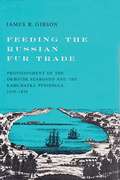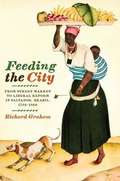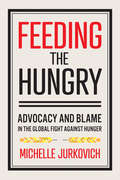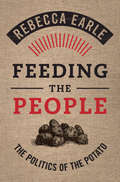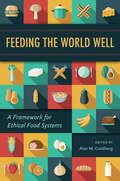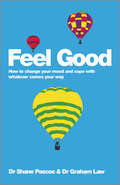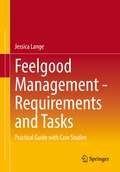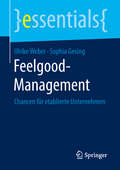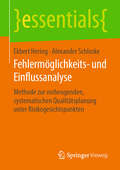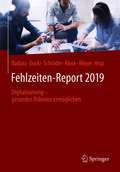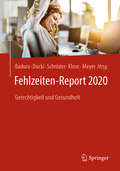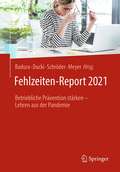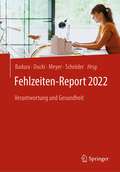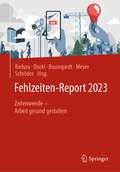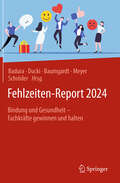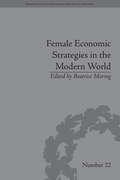- Table View
- List View
Feeding France
by E. C. SparyFeeding France is the first comprehensive study of the French food industry in the decades surrounding the French Revolution of 1789. Though the history of gastronomy and the restaurant have been explored by scholars, few are aware that France was also one of the first nations to produce industrial foods. In this time of political and social upheaval, chemists managed to succeed both as public food experts and as industrial food manufacturers. This book explores the intersection between knowledge, practice and commerce which made this new food expertise possible, and the institutional and experimental culture which housed it. Ranging from the exigencies of Old Regime bread-making to the industrial showcasing of gelatine manufacture, Emma Spary rewrites the history of the French relationship with food to show that industrialisation and patrimonialism were intimately intertwined.
Feeding The Russian Fur Trade
by James R. GibsonJames R. Gibson offers a detailed study that is both an account of this chapter of Russian history and a full examination of the changing geography of the Okhotsk Seaboard and the Kamchatka Peninsula over the course of two centuries.
Feeding a Divided America: Reflections of a Western Rancher in the Era of Climate Change (New Century Gardens and Landscapes of the American Southwest)
by Gilles StocktonIn Feeding a Divided America, third-generation Montana rancher and international agriculture development specialist Gilles Stockton explores the causes of what he refers to as the “rural-urban divide” and how this widening chasm between rural America and urban centers threatens our democracy. Indeed, it determines the structure of our society, including the physical and political landscapes in which we live. Stockton shows how big banks, international food conglomerates, urban expectations, and US farm policy have all furthered the demise of small towns across America.These essays provide a clear portrait of national food issues surrounding market competition, US trade policy, wildlife controversies, climate change, supply-chain disruptions, and US farm policy, topics that transcend all geopolitical boundaries. Stockton stands firm with American farmers and ranchers, offering potential remedies to these issues in the face of concerns over livelihood, the future of American food systems, and the future of our planet. Stockton’s essays are timely, and they challenge American urbanites and rural folk alike to find ways for all of us to coexist in a changing environment. Whether we eat may depend on it.
Feeding the City
by Richard GrahamOn the eastern coast of Brazil, facing westward across a wide magnificent bay, lies Salvador, a major city in the Americas at the end of the eighteenth century. Those who distributed and sold food, from the poorest street vendors to the most prosperous traders—black and white, male and female, slave and free, Brazilian, Portuguese, and African—were connected in tangled ways to each other and to practically everyone else in the city, and are the subjects of this book. Food traders formed the city’s most dynamic social component during the late eighteenth and early nineteenth centuries, constantly negotiating their social place. The boatmen who brought food to the city from across the bay decisively influenced the outcome of the war for Brazilian independence from Portugal by supplying the insurgents and not the colonial army. Richard Graham here shows for the first time that, far from being a city sharply and principally divided into two groups—the rich and powerful or the hapless poor or enslaved—Salvador had a population that included a great many who lived in between and moved up and down. The day-to-day behavior of those engaged in food marketing leads to questions about the government’s role in regulating the economy and thus to notions of justice and equity, questions that directly affected both food traders and the wider consuming public. Their voices significantly shaped the debate still going on between those who support economic liberalization and those who resist it.
Feeding the Hungry: Advocacy and Blame in the Global Fight against Hunger
by Michelle JurkovichFood insecurity poses one of the most pressing development and human security challenges in the world. In Feeding the Hungry, Michelle Jurkovich examines the social and normative environments in which international anti-hunger organizations are working and argues that despite international law ascribing responsibility to national governments to ensure the right to food of their citizens, there is no shared social consensus on who ought to do what to solve the hunger problem. Drawing on interviews with staff at top international anti-hunger organizations as well as archival research at the United Nations Food and Agriculture Organization, the UK National Archives, and the U.S. National Archives, Jurkovich provides a new analytic model of transnational advocacy. In investigating advocacy around a critical economic and social right—the right to food—Jurkovich challenges existing understandings of the relationships among human rights, norms, and laws. Most important, Feeding the Hungry provides an expanded conceptual tool kit with which we can examine and understand the social and moral forces at play in rights advocacy.
Feeding the People: The Politics of the Potato
by Rebecca EarlePotatoes are the world's fourth most important food crop, yet they were unknown to most of humanity before 1500. Feeding the People traces the global journey of this popular foodstuff from the Andes to everywhere. The potato's global history reveals the ways in which our ideas about eating are entangled with the emergence of capitalism and its celebration of the free market. It also reminds us that ordinary people make history in ways that continue to shape our lives. Feeding the People tells the story of how eating became part of statecraft, and provides a new account of the global spread of one of the world's most successful foods.
Feeding the World Well: A Framework for Ethical Food Systems
by Alan M. GoldbergLeading experts reveal ways that the future of food production for the world's burgeoning population can (and must) be both sustainable and ethical.In the United States, food is abundant and cheap but loaded with hidden costs to the environment, human health, animal welfare, and the people who work in our food systems. The country's current food production systems lack diversity in crops and animals and are intensified but not sustainable, inhumane in the treatment of animals, and inconsiderate of labor. In order to feed the world's rapidly growing population with high-quality, ethically produced food, new food production systems are urgently needed. These new systems must be genetically diverse and environmentally sustainable, and they need to follow internationally recognized animal welfare and labor practices.Feeding the World Well examines these costs of cheap food while presenting a unique framework for ethical food systems: the Core Ethical Commitments, which are designed to guide consumers in choosing foods that are aligned with their values while helping producers enhance the ethics of their practices and products. Edited by Alan M. Goldberg, the volume features contributions from leading ethicists and food systems experts. Addressing complex issues such as climate change, worker exploitation, obesity, antibiotic resistance, wasted food, and biotechnology, the book discusses the fundamental forces that have shaped, and will continue to shape, our food systems. It also describes some of the approaches that food companies and nonprofit organizations are using to address the ethical challenges facing these food systems. Finally, the book explains what the Core Ethical Commitments are (and what they are not), how they were developed, and how they might be used by food system actors.By bringing together an all-star group of contributors from academia and industry, Feeding the World Well sets a new course for food production and how it is evaluated. By including the voices of industry leaders alongside those of researchers and regulators, the book prepares the food production industry for a world in which "ethical" or "sustainable" production practices are not only trendy but necessary to ensure that we can feed the world's growing population. Conceived as a textbook for food studies courses, this volume will appeal to anyone who is strongly interested in food, including conscious consumers, food industry leaders, researchers, and policy makers.Contributors: Anne Barnhill, Martin W. Bloem, Jonathan Bloom, Nicole M. Civita, Claire Davis, Michiel van Dijk, Adele Douglass, Shauna Downs, Kevin Esvelt, Ruth Faden, Jessica Fanzo, Evan Fraser, Maisie Ganzler, Tara Garnett, Sara Glass, Alan M. Goldberg, Christopher Good, Meredith Kaufman, Gillian Kelleher, Frederick L. Kirschenmann, Herman B. W. M. Koëter, Jennifer Kuzma, Kees van Leeuwen, Robert Martin, Anne E. McBride, Suzanne McMillan, Tom Morley, Marion Nestle, Peter O'Driscoll, Lance B. Price, Marie Luise Rau, Bernard Rollin, Yashar Saghai, Susan A. Schneider, Ellen K. Silbergeld, Paul B. Thompson, Paul Willis, Sylvia Wulf
Feel Good Management – Anforderungen und Aufgabengebiete: Praxishandbuch mit Fallbeispielen
by Jessica LangeLernen Sie mit diesem Fachbuch den Beruf des Feel Good Managers näher kennenDas Feel Good Management ist ein neues Konzept, welches den Trend in Unternehmen zur Mitarbeiterorientierung ausdrückt. Diese Mitarbeiterorientierung gilt mit Blick auf den stark zunehmenden Wettbewerb auf dem Arbeitsmarkt in Zukunft als zentraler Kompetenzfaktor eines Unternehmens. So sollen Faktoren wie Fachkräftemangel oder der sogenannte War for Talents ausgeglichen werden.Dieses Buch gibt Ihnen einen umfangreichen Überblick über die Anforderungen und Aufgaben eines Feel Good Managers. Dazu gehören unter anderem: MitarbeitermotivationVerbesserung der Arbeitsatmosphäre durch Teambuilding-MaßnahmenSteigerung der ArbeitgeberattraktivitätGrundlagen der MitarbeiterführungPersonalentwicklung und MitarbeiterorientierungKonfliktmanagementSteigerung der MitarbeiterzufriedenheitLangfristige MitarbeiterbindungDas Buch richtet sich sowohl an Feel Good Manager als auch Unternehmer, die Klarheit und Verständnis über die Position und Aufgaben dieses Berufs bekommen und ihr Wissen in zentralen Aufgabenbereichen vertiefen möchten. Darüber hinaus ist dieses Buch auch für Führungskräfte sinnvoll. Denn durch das operative Geschäft kann es oftmals zu kurz kommen, Mitarbeiterbedürfnisse frühzeitig zu erkennen und zu berücksichtigen. Dieses Buch zeigt Ihnen, wie Sie die Vorteile des Feel Good Managements für Ihr Unternehmen nutzen können.Feel Good Management von A-ZDas Buch über Feel Good Management gibt einen einführenden Überblick über die Thematik. Viele Praxistipps helfen bei der Umsetzung im eigenen Betrieb. Im Speziellen werden die folgenden Inhalte behandelt:Einführung ins Feel Good ManagementAufgaben und Anforderungen des Feel Good Managers im ÜberblickWeiterentwicklung einer UnternehmenskulturVerbesserung der internen KommunikationUnterstützung des PersonalmanagementsSelbstmanagement des Feel Good Managers und Unterstützung des betrieblichen Gesundheitsmanagements
Feel Good: How to Change Your Mood and Cope with Whatever Comes Your Way
by Shane Pascoe Graham LawA practical, inspirational guide to managing your moods, improving your outlook, and beating stress and anxiety Feeling overwhelmed, overstressed, or just plain down about life? This book is the cure for what ails you. Mood can affect every aspect of your life, from your performance at work to your personal relationships, and being able to take control of your moods, rather than have them control you, is something all the most successful people have in common. Combining techniques from two powerful, complementary therapeutic approaches–Cognitive Behavioural Therapy and Mindfulness–Feel Good is an everyday mood control book that can help you keep your spirits and your confidence high, and instill you with a more upbeat, positive, can-do attitude, come what may. A source of inspiration for world-weary nine-to-fivers and an expert guide to beating stress and anxiety Combines the latest research and proven techniques and practices from two powerful therapeutic approaches: CBT and Mindfulness Packed with practical information on how to start feeling happier and more positive about life, and optimize how you deal with people and situations in life and at work Designed for quick reference it lets you access practical information relevant to the mood you’re in at the moment
Feel-Good Finance: Untangle Your Relationship with Money for Better Mental, Emotional, and Financial Well-Being
by Aja EvansBudgeting is more than just simple math. Money impacts every aspect of our lives—including and especially our mental health. With expert tips and guidance from a licensed financial therapist, this judgment-free book will help you take control of your money while prioritizing your financial wellness. Picture this: You&’re at a group dinner scanning the pricey menu in dread, knowing you have food at home. When it comes time to pay, your friend proclaims, &“We should split the check!&” So you hand over your card, praying it&’s not declined, while internally screaming, But I only got water! If that sounds all too familiar, you&’re not alone. Coined the &“feel-good financial therapist,&” Aja Evans can relate—and she wants to help. Feel-Good Finance peels away the layers of niceties that hinder our ability to get real and talk about money. Where other financial education books provide the &“what,&” this one will give you the &“why.&”` Based on years of clinical practice, training, and lived experiences, Evans will equip readers with an accessible, researched-based route to financial empowerment. In this book, she will uplift you to: Understand your unique relationship with money Learn the 6 most common financial attitudes—and the psychological basis behind them Build generational wealth Let go of financial beliefs that no longer serve you Your mindset about money is more important than ever before, especially for women and people of color. Feel-Good Finance will prepare you to rewrite your wealth narrative, help you heal your relationship with money once and for all, and attain the financial freedom you deserve.
Feelgood Management - Requirements and Tasks: Practical Guide with Case Studies
by Jessica LangeThis practical guide provides the reader with a comprehensive overview and detailed insight into the essential requirements and tasks of a Feelgood Manager. Feelgood Management is a new management concept that expresses the trend towards employee orientation. After customer orientation, employee orientation is considered a central future competence factor in corporate competition, especially in view of the increasing competition on the labor market (shortage of skilled workers, war for talents). The book is aimed at existing and future Feelgood Managers, who on the one hand want to get clarity and understanding about the position and tasks and on the other hand want to deepen or broaden their knowledge in key areas of responsibility. Beyond that, however, this book is useful not only for Feelgood Managers, but for anyone who manages employees. The recognition and consideration of employee needs is a task of personnel management, which is often neglected through no fault of the operational business. The reader is provided with key insights and simple ways to take advantage of Feelgood Management. The book on Feelgood Management provides an introductory overview of the topic. Many practical tips help with the implementation in one's own business. In particular, the following contents are covered: · Introduction to Feelgood Management · Tasks and requirements of the Feelgood Manager at a glance · Further development of the corporate culture Improvement of internal communication Support of the personnel management Self-management of the Feelgood Manager and support of company health management This book is a translation of an original German edition. The translation was done with the help of artificial intelligence (machine translation by the service DeepL.com). A subsequent human revision was done primarily in terms of content, so that the book will read stylistically differently from a conventional translation.
Feelgood-Management: Chancen für etablierte Unternehmen (essentials)
by Ulrike Weber Sophia GesingDieses essential beschreibt, wie das Konzept des Feelgood-Managements auch für etablierte Unternehmen einen Mehrwert bietet. Ulrike Weber und Sophia Gesing zeigen in dem Folgeband zu „Konzept und Berufsbild des Feelgood-Managements“ die Chancen auf, mit Feelgood-Management organisatorische Agilität zu fördern. Dazu stellen die Autorinnenwerden inhaltliche Gemeinsamkeiten und Unterschiede von Feelgood-Management zu anderen Führungskonzepten wie auch die Schnittstellen und Synergien mit anderen Organisationseinheiten dargestellt. Der Band liefert einen fundierten als auch praxisorientierten Ausblick auf die Chancen von Feelgood-Management in etablierten Unternehmen.
Feeling Stuck and Doubting Ourselves: The Effect of the Past on Your Present Life
by Timothy ButlerAs psychological impasse deepens, it brings with it unresolved issues from the past. Ghosts - your past self, the overbearing parent, etc. - that you pushed to the back of your mind rear up, causing you to doubt yourself and your path in life. This chapter includes an exercise to help you acknowledge these ghosts so that you can finally banish them.
Fehler im Griff: Fehlleistungen begreifen. Fehlertypen unterscheiden. Fehlerursachen vermeiden.
by Martin SauerlandDieses Buch enthält alles, was Sie über Fehler, Fehlerursachen, vor allem aber über die Möglichkeiten der Vermeidung von Fehlern bei typischen Bürotätigkeiten wissen müssen. Sie kennen es (natürlich nur vom Hörensagen): Die Originalvorlage im Kopierer liegen lassen, eine E-Mail ohne den erforderlichen Anhang versenden, eine vertrauliche Nachricht falsch adressieren, eine Rechnung über 17683 € statt über 17863 € ausstellen oder eine Stelle mit einer inkompetenten Person besetzen – menschliche Fehlleistungen sind ärgerlich, zumeist auch peinlich, zuweilen auch enorm kostspielig. Im Rahmen zahlreicher wissenschaftlicher Analysen sind wir den Häufigkeiten, Typen, Ursachen und Bewältigungsmöglichkeiten solcher Heimsuchungen auf den Grund gegangen. Die Befunde werden auf beispielhafte, anschauliche und amüsante Weise vorgestellt. Der Fokus liegt dabei auf den tieferliegenden motivationalen Fehlerursachen. Die Berücksichtigung dieser energetischen Komponente ermöglicht es nämlich, neue und wirkmächtige Strategien zur Vermeidung von Fehlern in einer immer komplexer und dynamischer werdenden Arbeitswelt zu entwickeln. Die entsprechenden Methoden können von Mitarbeitenden und Führungskräften niedrigschwellig, unmittelbar und selbstgesteuert angewendet werden. Vielleicht ist es durch authentisch-motiviertes Handeln sogar möglich, so etwas wie subjektiv erlebte Fehlerfreiheit zu erreichen. Doch lesen Sie selbst! Zum Autor: Dr. Martin Sauerland, Professor für Arbeit und Organisation an der Hochschule für öffentliche Verwaltung und Finanzen in Ludwigsburg.
Fehlermöglichkeits- und Einflussanalyse: Methode zur vorbeugenden, systematischen Qualitätsplanung unter Risikogesichtspunkten (essentials)
by Ekbert Hering Alexander SchloskeDie Fehlermöglichkeits- und Einflussanalyse (FMEA) ist ein mächtiges Werkzeug des präventiven Qualitäts- und Risikomanagements. Mit ihrer Hilfe lässt sich im Vorfeld der Produktentwicklung bzw. der Produktionsplanung systematisch analysieren, welche potenziellen Fehler es gibt, wie gravierend diese Fehler für den Kunden sind und wie groß die Wahrscheinlichkeit des Auftretens und des Entdeckens der Fehler sind. Daraus lässt sich das Risiko abschätzen. Dies geschieht durch eine Risikoprioritätszahl bzw. in einer Risikomatrix. Für nicht akzeptable Risiken werden Optimierungsmaßnahmen zur Fehlervermeidung und/oder Fehlerentdeckung vorgenommen. Deren Wirksamkeit zur Qualitätsverbesserung wird bewertet. An einem Beispiel mit Softwareunterstützung wird die Methode praxisnah und direkt umsetzbar vorgestellt.Die Autoren:Dr. rer. nat. Dr. rer. pol. Dr. h.c. Ekbert Hering lehrt und forscht an der Hochschule Aalen. Er ist Verfasser erfolgreicher Fachbücher in renommierten Verlagen. Dr.-Ing. Alexander Schloske forscht in der Abteilung Nachhaltige Produktion und Qualität am Fraunhofer-Institut für Produktionstechnik und Automatisierung (IPA), Stuttgart.
Fehlzeiten-Report 2019: Digitalisierung - gesundes Arbeiten ermöglichen (Fehlzeiten-Report #2019)
by Antje Ducki Helmut Schröder Bernhard Badura Joachim Klose Markus MeyerZahlen, Daten, Analysen aus allen Branchen der WirtschaftDer Fehlzeiten-Report, der jährlich als Buch erscheint, informiert umfassend über die Struktur und Entwicklung des Krankenstandes der Beschäftigten in der deutschen Wirtschaft und beleuchtet dabei detailliert einzelne Branchen. Der vorliegende Fehlzeiten-Report zeigt Facetten des Themas „Digitalisierung – gesundes Arbeiten ermöglichen“ aus gesellschaftlicher, unternehmerischer und individueller Perspektive auf. Neben Praxisbeispielen werden auch digitale Anwendungen, die im Rahmen des Betrieblichen Gesundheitsmanagements zum Einsatz kommen können, vorgestellt. 26 Fachbeiträge diskutieren u. a. folgende Fragen: Welche Chancen und Risiken ergeben sich durch die Digitalisierung für die Arbeitswelt und für die Gesundheit der Beschäftigten? Wie kann entgrenztes Arbeiten gesundheitsgerecht gestaltet werden? Welche Herausforderungen und Chancen ergeben sich zukünftig für das Betriebliche Gesundheitsmanagement?Darüber hinaus ist der Report durch umfassende Daten und Analysen ein wertvoller Ratgeber für alle, die Verantwortung für den Arbeits- und Gesundheitsschutz in Unternehmen tragen.
Fehlzeiten-Report 2020: Gerechtigkeit und Gesundheit (Fehlzeiten-Report #2020)
by Antje Ducki Helmut Schröder Bernhard Badura Joachim Klose Markus MeyerZahlen, Daten, Analysen aus allen Branchen der WirtschaftDer Fehlzeiten-Report, der jährlich als Buch erscheint, informiert umfassend über die Struktur und Entwicklung des Krankenstandes der Beschäftigten in der deutschen Wirtschaft und analysiert dabei detailliert einzelne Branchen. Der aktuelle Fehlzeiten-Report widmet sich dem Thema „Gerechtigkeit und Gesundheit“ und berücksichtigt dabei neben gesellschaftlichen und unternehmerischen auch individuelle Blickwinkel: 20 Fachbeiträge zeigen vielschichtige Perspektiven auf und diskutieren u. a.: Was ist eigentlich Gerechtigkeit und wie kann Arbeit gerecht gestaltet werden? Was heißt gerechtes Handeln in Unternehmen ganz konkret? Welche Anforderungen haben Beschäftigte an eine gerechte Führungskraft? Und was sind die gesundheitlichen Folgen, wenn sich Beschäftigte subjektiv ungerecht behandelt fühlen? Welchen Beitrag kann das Betriebliche Gesundheitsmanagement leisten, wenn es um Fragen der Gerechtigkeit geht?Im umfangreich erweiterten Kapitel "Daten und Analysen" liefern zahlreiche Beiträge fundierte Antworten – u.a. zur Aussagekraft der Kennzahl „Fehlzeiten“, zur Bedeutung psychischer Erkrankungen für Beschäftigte und Betriebe, zum Arbeitsunfallgeschehen, Krankengeld und Erwerbsminderungsrente – für alle, die Verantwortung für den Arbeits- und Gesundheitsschutz in Unternehmen tragen.
Fehlzeiten-Report 2021: Betriebliche Prävention stärken – Lehren aus der Pandemie (Fehlzeiten-Report #2021)
by Antje Ducki Helmut Schröder Bernhard Badura Markus MeyerZahlen, Daten, Analysen aus allen Branchen der WirtschaftDer Fehlzeiten-Report, der jährlich als Buch erscheint, informiert umfassend über die Struktur und Entwicklung des Krankenstandes der Beschäftigten in der deutschen Wirtschaft und beleuchtet dabei detailliert einzelne Branchen. Der aktuelle Report möchte wissenschaftlich fundiert „Betriebliche Prävention stärken“ und diskutiert, welche „Lehren aus der Pandemie“ Unternehmen und Beschäftigte ziehen können. Der vorliegende Fehlzeiten-Report umfasst 26 Fachbeiträge und richtet den Blick auf die Historie und fragt auch nach zukünftigen gesundheitlichen Bedrohungen für Gesellschaft und Wirtschaft und damit einhergehenden Herausforderungen für gesundes Arbeiten thematisiert Folgen der pandemiebedingten Maßnahmen für die Gesellschaft und insbesondere für die Arbeitswelt gibt Antworten auf die Frage, wie Gesellschaft und Wirtschaft mit der Krise umgegangen sind und was Beschäftigte und Unternehmen aus der Krise lernen können zeigt auf, welchen Beitrag das Betriebliche Gesundheitsmanagement leisten kann, damit Unternehmen und Beschäftigte idealerweise gestärkt aus dieser Krise hervorgehen. In gewohnter Qualität liefern fünf weitere Beiträge im Kapitel Daten und Analysen darüber hinaus fundierte Antworten für alle, die Verantwortung für den Arbeits- und Gesundheitsschutz in Unternehmen tragen.
Fehlzeiten-Report 2022: Verantwortung und Gesundheit (Fehlzeiten-Report #2022)
by Antje Ducki Helmut Schröder Bernhard Badura Markus MeyerZahlen, Daten, Analysen aus allen Branchen der WirtschaftDer jährlich als Buch erscheinende Fehlzeiten-Report informiert umfassend über Strukturen und Entwicklungen des Krankenstandes von Beschäftigten der deutschen Wirtschaft und beleuchtet dabei einzelne Branchen detailliert. Der diesjährige Schwerpunkt liegt auf der Unternehmensverantwortung bezüglich ihrer ökonomischen, ökologischen und sozialen Rolle für die Gesellschaft in einer von tiefgreifenden Krisen und Transformationsprozessen geprägten Zeit.Der Fehlzeiten-Report 2022 erörtert wissenschaftlich fundiert u. a.die Notwendigkeit einer multiplen, ebenenübergreifenden Verantwortungsübernahmedie Bedeutung von Nachhaltigkeitsmanagement für Unternehmenwie gesellschaftlich verantwortungsvolles Handeln mit der Arbeitszufriedenheit und der Gesundheit der Beschäftigten in Zeiten mobiler und hybrider Arbeit zusammenhängtwas es bedeutet, wenn „Gesundheit“ in den unternehmerischen Wertekanon aufgenommen und in unternehmerische Prozesse und Abläufe integriert wirdwelchen Nutzen und welches Potenzial das Thema Verantwortung für das Betriebliche Gesundheitsmanagement birgtIn gewohnter Qualität liefert die Rubrik Daten und Analysen darüber hinaus Informationen für alle, die Verantwortung für den Arbeits- und Gesundheitsschutz in Unternehmen tragen.
Fehlzeiten-Report 2023: Zeitenwende – Arbeit gesund gestalten (Fehlzeiten-Report #2023)
by Antje Ducki Helmut Schröder Bernhard Badura Markus Meyer Johanna BaumgardtZahlen, Daten, Analysen aus allen Branchen der Wirtschaft - Der jährlich als Buch erscheinende Fehlzeiten-Report informiert umfassend über Strukturen und Entwicklungen des Krankenstandes von Beschäftigten der deutschen Wirtschaft und beleuchtet dabei einzelne Branchen detailliert. Das diesjährige Schwerpunktthema ist "Zeitenwende gesund und nachhaltig gestalten".In gewohnter Qualität liefert die Rubrik Daten und Analysen darüber hinaus Informationen für alle, die Verantwortung für den Arbeits- und Gesundheitsschutz in Unternehmen tragen.
Fehlzeiten-Report 2024: Bindung und Gesundheit - Fachkräfte gewinnen und halten (Fehlzeiten-Report #2024)
by Antje Ducki Helmut Schröder Bernhard Badura Markus Meyer Johanna BaumgardtZahlen, Daten, Analysen aus allen Branchen der Wirtschaft - Der jährlich als Buch erscheinende Fehlzeiten-Report informiert umfassend über Strukturen und Entwicklungen des Krankenstandes von Beschäftigten der deutschen Wirtschaft und beleuchtet dabei einzelne Branchen detailliert. Das diesjährige Schwerpunktthema ist "Bindung und Gesundheit - Fachkräfte gewinnen und halten".In gewohnter Qualität liefert die Rubrik Daten und Analysen darüber hinaus Informationen für alle, die Verantwortung für den Arbeits- und Gesundheitsschutz in Unternehmen tragen.
Fei Cheng Wu Rao (If You Are the One): The Media as a Reflection of Society
by Christopher Marquis Juelin Yin Zoe YangAs Fei Cheng Wu Rao, China's most popular entertainment program, enters its fourth year, company leaders grapple with questions of how to keep the show fresh and reach new markets. In particular, the show is poised to expand to Africa, yet there are significant questions about how to tailor a program designed to capture the attention of a unique demographic within China to new cultural contexts.
Fei Ni Mo Shu (You are the One) and the Chinese Employment Market
by Christopher Marquis Qi Li Ying ZhangThis case study shows the evolution of the Chinese television program Fei Ni Mo Shu (You are the One), from an unrecognized show in 2010 to becoming a television phenomenon in 2015. The success of Fei Ni Mo Shu (You are the One) has resulted from it reflecting the current Chinese labor market, people's career attitudes and what Chinese employers demand from the employees. As Fei Ni Mo Shu enters its sixth year, the show's producer grapples with questions of how to keep the show fresh and appealing as the underlying social and economic conditions that led to its success change.
Female Economic Strategies in the Modern World (Perspectives in Economic and Social History #22)
by Beatrice MoringThis collection of essays looks at the various ways in which women have coped financially in a male-dominated world. Chapters focus on Europe and Latin America, and cover the whole of the modern period.

